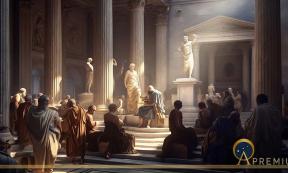Primary tabs
Robert Garland
Dr Robert Garland is the Roy D. and Margaret B. Wooster Emeritus Professor of the Classics at Colgate University. He obtained his M.A. in Classics from McMaster University and his Ph.D. in Ancient History from University College London. His research focuses on the social, religious, political, and cultural history of both Greece and Rome. He has written 17 books including The Greek Way of Death, The Piraeus, The Greek Way of Life, Introducing New Gods, Religion and the Greeks, The Eye of the Beholder, Everyday Life in the Birthplace of Western Civilization, Surviving Greek Tragedy, Julius Caesar, Celebrity in Antiquity, Hannibal, Wandering Greeks, Athens Burning , How To Survive in Ancient Greece, Greek Mythology: Gods and Heroes Brought to Life, Roman Legends Brought to Life, and An Ordinary Man’s Rather Long Letter to God and Roman Legends Brought to Life
History
- Member for
- 8 months 2 days
Opt-in to Ancient Origins Newsletter (AC):
Yes
























